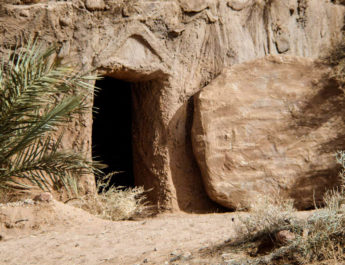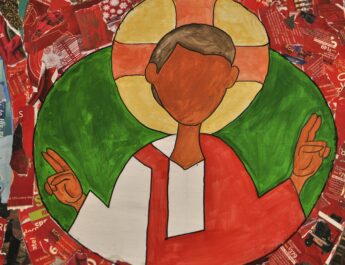Matthew 22:23-33
A Women’s Lectionary 23
23 The same dayA some SadduceesB cameC to him, saying there is no resurrection;D and they asked him a question,E saying,
A “day” = hemera. Perhaps from hemai (to sit). This is day, time, or daybreak.
B “Sadducees” = Saddoukaios. 14x in NT. Probably from Hebrew tsadoq (Zadok, a personal name); from tsadaq (to be just or righteous, do justice); from tsedeq (rightness, righteousness, just cause, vindication; that which is right in a natural, moral, or legal sense; abstractly equity; figuratively prosperity). This is a Sadducee. Whereas the Sadducees were part of the priestly line and inherited their religious position and responsibilities, Pharisees were regular people who studied the scriptures and offered guidance to regular folk. Sadducees were often wealthier and willing to sacrifice their identity to rub elbows with Roman society. Pharisees were often more concerned with what it meant to follow God without compromising what made them different as followers of God. Sadducees primarily believed in that which was written down (the first five books of the Bible) and Pharisees believed in the Bible and the traditions of the elders.
C “came” = proserchomai. From pros (for, at, towards) + erchomai (to come, go). This is to approach, draw near, come up to. It is also used figuratively to mean worship.
D “resurrection” = anastasis. From anistemi (to raise up, rise, appear; to stand up literally or figuratively. Can also mean to resurrect); from ana (upwards, up, again, back, anew) + histemi (to make to stand, place, set up, establish, appoint, stand by, stand still, stand ready, stand firm, be steadfast). This is literally standing up or standing again. It is used figuratively for recovering a spiritual truth. It can be raising up, rising, or resurrection.
E “asked…a question” = eperotao. From epi (on, upon, against, what is fitting) + erotao (asking a question or making an earnest request; used when one anticipates special consideration for their request); {from eromai (to ask) OR from ereo (to say, tell, call, speak of)}. This is to question, interrogate, seek, or demand. The questioner is at an advantage – in a preferred position when they make their question.
24 “Teacher,F MosesG said, ‘If a man diesH childless,I
F “teacher” = didaskalos. From didasko (to teach, direct, instruct, or impart knowledge; in the New Testament, almost always used for teaching scripture); from dao (to learn). This is teacher or master.
G “Moses” = Mouses. From Hebrew Mosheh (Moses); from mashah (to pull out in a literal or figurative sense, to draw out) OR from Egyptian mes or mesu (child, son i.e. child of…). This is Moses – the one drawn out from the water, which is to say, rescued. If derived from the Egyptian, his name would share a root with Rameses and Thutmose.
H “dies” = apothnesko. From apo (from, away from) + thnesko (to die, be dead). This is to die off. It is death with an emphasis on the way that death separates. It can also mean to wither or decay.
I “childless” = me + echo + teknon. Literally, “not having children.” Echo is to have, hold, possess. Teknon is from tikto (to beget, bring forth, produce). This is a child, descendant, or inhabitant.
his brotherJ shall marryK the widow,L and raise upM childrenN for his brother.’
J “brother” = adelphos. From a (with, community, fellowship) + delphus (womb). This is a brother in a literal or figurative sense. It is also used of another member of the Church.
K “marry” = epigambreuo. 1x in NT. From epi (on, upon, against, what is fitting) + gambros (connection through marriage) OR epi (see above) + gamos (a wedding, whether the ceremony, the feast, or the marriage itself). This is to marry, particularly a levirate marriage.
L “widow” = gune. Perhaps from ginomai (to come into being, to happen, become, be born; to emerge from one state or condition to another; this is coming into being with the sense of movement or growth). This is woman, wife, or bride. This is where the word “gynecologist” comes from.
M “raise up” = anistemi. Related to “resurrection” in v23. See note D above.
N “children” = sperma. From speiro (to sow seed, spread, scatter); perhaps from spao (to pull, to draw a sword). This is something sown so it could be seed or offspring and descendants. This is where the word “sperm” comes from.
25 Now there were sevenO brothers among us; the firstP married,Q and diedR childless,S leavingT the widow to his brother.
O “seven” = hepta. This is seven or seventh. Figuratively, seven is the number of completeness or perfection.
P “first” = protos. From pro (before, first, in front of, earlier). This is what is first, which could be the most important, the first in order, the main one, the chief.
Q “married” = gameo. Related to “marry” in v24. From gamos (see note K above). This is to marry.
R “died” = teleutao. 13x in NT. From teleute (end, finishing, consummation; can also be used for death); from teleo (to complete, fulfill, accomplish, end); from telos (an end, aim, purpose, completion, end goal, consummation, tax; going through the steps to complete a stage or phase and then moving on to the next one). This is to complete or come to the end/end goal. It can also mean to finish life or to meet one’s ultimate fate in heaven or hell.
S “childless” = me + echo + sperma. Literally, “not having offspring.” Echo is the same as “childless” in v24. See note I above. Sperma is the same as “children” in v24. See note N above.
T “leaving” = aphiemi. From apo (from, away from) + hiemi (to send). This is send away, release, permit, forgive, allow to depart, discharge, or send forth.
26 The secondU did the same, so also the third,V down to the seventh. 27 LastW of all,X the womanY herself died.Z 28 In the resurrection, then, whose wifeAA of the seven will she be? For all of them had married her.”
U “second” = deuteros. From duo (two, both). This is second, twice, again. It is part of where “Deuteronomy” comes from, which means “second law” or “a repetition of the law.” See https://en.wiktionary.org/wiki/Deuteronomy
V “third” = tritos. From treis (three). This is third.
W “last” = husteron. 11x in NT. From husteros (last, later); from hupo (by, under, about, subordinate to). This is afterwards, eventually, lastly.
X “all” = pas. This is all or every.
Y “woman” = gune. Same as “widow” in v24. See note L above.
Z “died” = apothnesko. Same as “dies” in v24. See note H above.
AA “wife” = gune. Same as “widow” in v24. See note L above.
29 JesusBB answered them, “You are wrong,CC because you knowDD neither the scripturesEE nor the powerFF of God.GG
BB “Jesus” = Iesous. From Hebrew Yehoshua (Joshua, the Lord is salvation); {from YHVH (proper name of the God of Israel; the self-existent and eternal one); {from havah (to become) or from hayah (to come to pass, become, be)} + yasha (to deliver, defend, help, preserve, rescue; properly, to be open, wide or free, which implies being safe. So, in a causative sense, this is to free someone)}. This is Jesus or Joshua in Greek – the Lord saves or the Lord is salvation.
CC “are wrong” = planao. From plane (wandering – used figuratively for deceit, error, sin, fraudulence, or wandering from orthodoxy); from planos (wandering, misleading, a deceiver or imposter). This is to wander, lead astray, mislead, mistake, seduce, or deceive. Generally used to refer to sin – going off the right path or roaming from truth/virtue. This word shares a root with “planet” (as a heavenly body that wanders).
DD “know” = eido. This is to know, consider perceive, appreciate, behold, or remember. It means seeing with one’s eyes, but also figuratively, it means perceiving – seeing that becomes understanding. So, by implication, this means knowing or being aware.
EE “scriptures” = graphe. From grapho (to write). This is literally writing, a document. In the New Testament, this is always used for scripture.
FF “power” = dunamis. From dunamai (to be able, have power or ability). This is might, strength, physical power, efficacy, energy, and miraculous power. It is force literally or figuratively – the power of a miracle or the miracle itself.
GG “God” = Theos. From Proto-Indo-European origins, meaning do, put, place. This is God or a god in general.
30 For in the resurrection they neither marryHH nor are given in marriage,II but are like angelsJJ in heaven.KK
HH “marry” = gameo. Same as “married” in v25. See note Q above.
II “given in marriage” = gamisko. Related to “marry” in v24 & “married” in v25. 8x in NT. From gamos (see note K above). This is to give a daughter in marriage.
JJ “angels” = aggelos + Theos. Literally, “angels of God.” Aggelos is probably from ago (to lead, bring, carry, guide) + agele (flock, herd, drove); {also from ago (see above)}. This is angel or messenger. Properly, it is one sent with news or to perform a specific task. This messenger can be human or an angel from heaven. More commonly, it is used for angels in the New Testament. Theos is the same as “God” in v29. See note GG above.
KK “heaven” = ouranos. May be related to oros (mountain, hill) with the notion of height. This is the air, the sky, the atmosphere, and heaven. It is the sky that is visible and the spiritual heaven where God dwells. Heaven implies happiness, power, and eternity.
31 And as for the resurrection of the dead,LL have you not readMM what was said to you by God, 32 ‘I am the God of Abraham,NN the God of Isaac,OO and the God of Jacob’?PP
LL “dead” = nekros. Perhaps from nekus (corpse). This is dead of lifeless, mortal, corpse. It can also be used figuratively for powerless or ineffective. It is where the word “necrotic” comes from.
MM “read” = anaginosko. From ana (upwards, up, again, back, anew) + ginosko (know, recognize, learn from firsthand experience). This is literally to know again – to recognize, read, or discern.
NN “Abraham” = Abraam. From Hebrew Abraham (exalted father); from the same as Abiram (exalted father, a high father – lofty) {from ab (father literal or figurative) + rum (rise, bring up, being high, extol, exalt, haughty; to raise in a literal or figurative sense)}. This is Abraham, father of many nations or father of a multitude.
OO “Isaac” = Isaak. From Hebrew yitschaq (Isaac, “he laughs”); from tsachaq (to laugh, mock, play, make sport; this is laughing out loud whether in joy or in a scornful way). Isaac, meaning “he laughs.”
PP “Jacob” = Iakob. From Hebrew Yaaqov (Jacob); from the same as aqeb (heel, hind part, hoof, rear guard of an army, one who lies in wait, usurper). This is James, meaning heel grabber or usurper.
He is God not of the dead, but of the living.”QQ 33 And when the crowdRR heardSS it, they were astoundedTT at his teaching.UU
QQ “living” = zao. This is to live literally or figuratively. It is used for life including the vitality of humans, plants, and animals – it is life physical and spiritual and life everlasting.
RR “crowd” = ochlos. Related to “childless” in v24. Perhaps from echo (see note I above). This is a crowd, the common people, a rabble. Figuratively, it can refer to a riot.
SS “heard” = akouo. This is hear or listen, but it also means to understand by hearing. This is where the word “acoustics” comes from.
TT “astounded” = ekplesso. 13x in NT. From ek (out, out of) + plesso (to pound, strike, flatten; figuratively, cause a calamity). This is to strike with panic, astonish shock. It is a moment that shakes someone from their senses and leaves them dumbfounded or at a loss.
UU “teaching” = didache. Related to “Teacher” in v24. From didasko (see note F above). This is teaching or doctrine.
Image credit: “The Night” by Aksel Waldemar Johannessen, circa 1920.




